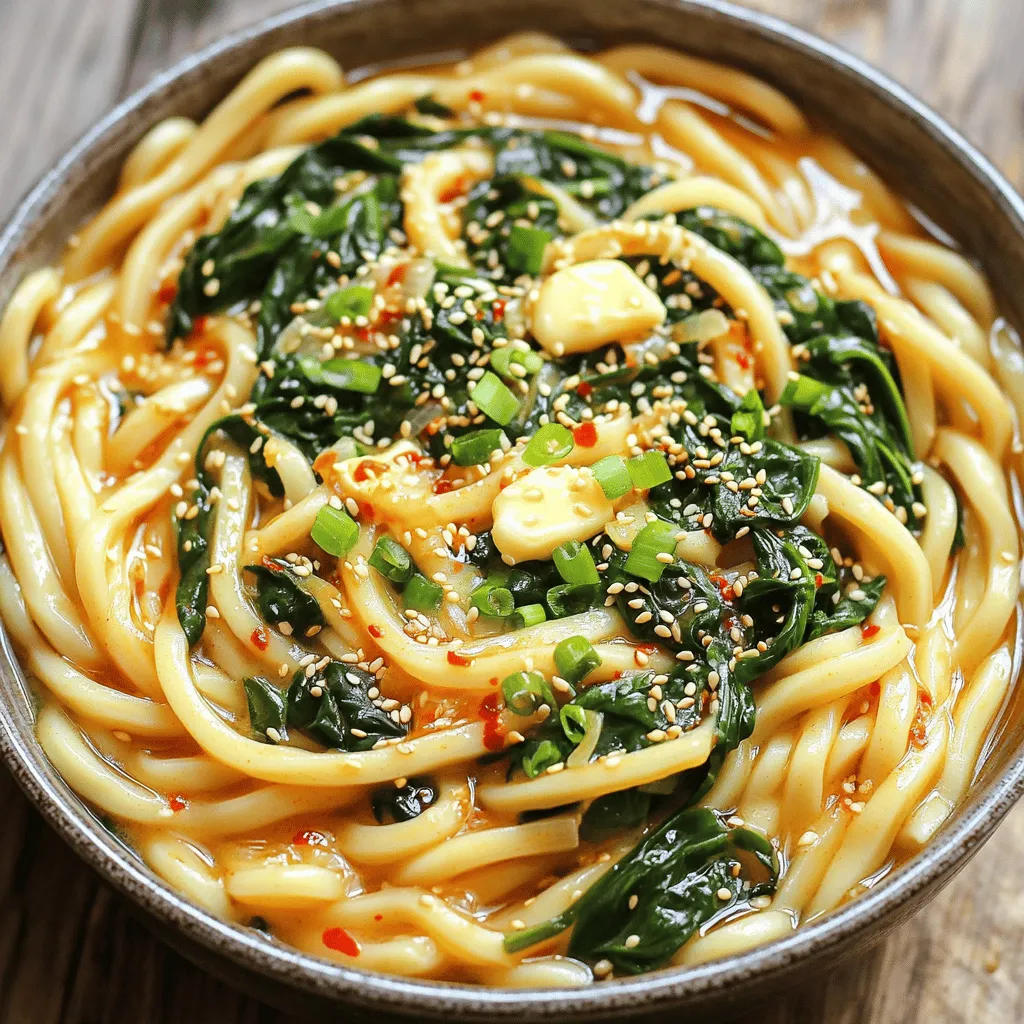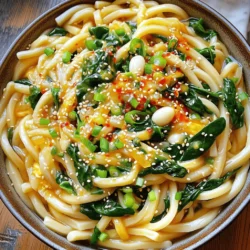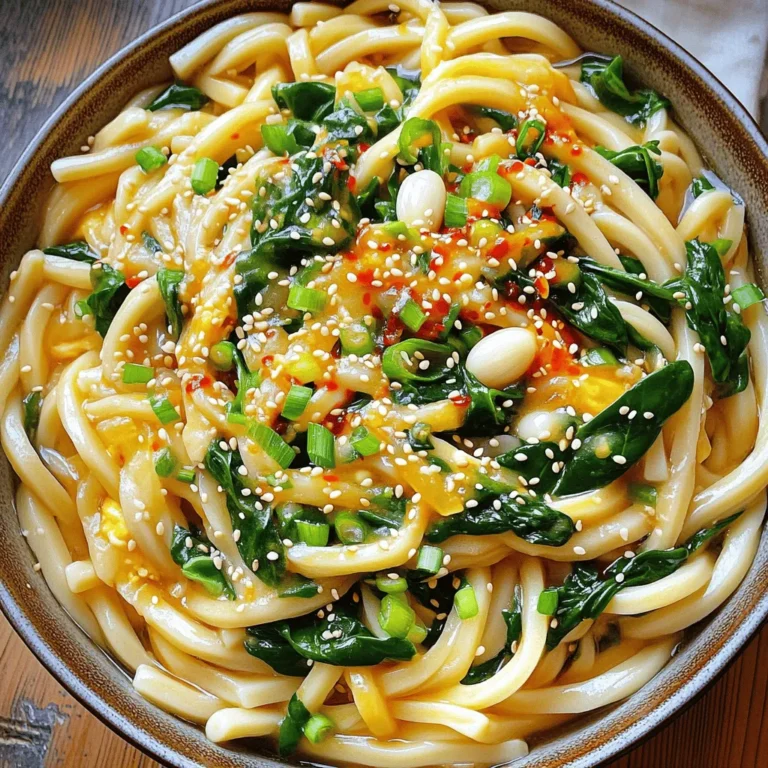Welcome to a world of flavor with my Spicy Garlic Butter Udon Noodles! This dish marries the rich taste of garlic and butter with a delightful kick of heat. Whether you’re a weeknight cook or a seasoned chef, these noodles are quick, easy, and so satisfying. Join me as I guide you through simple steps to make this flavorful delight right in your kitchen. Get ready to impress your taste buds!
Ingredients
List of Ingredients with Measurements
– 400g udon noodles
– 4 tablespoons unsalted butter
– 6 cloves garlic, minced
– 1 teaspoon red pepper flakes (adjust to taste)
– 2 tablespoons soy sauce
– 1 tablespoon sesame oil
– 1 tablespoon chili oil
– 2 green onions, finely sliced
– 1 cup baby spinach
– Salt and pepper to taste
– Sesame seeds for garnish
Essential Ingredients Explanation
Udon noodles are thick and chewy. They soak up flavors well. Unsalted butter gives a rich taste. Minced garlic adds a strong aroma. Red pepper flakes bring heat. Soy sauce adds umami. Sesame oil gives a nutty flavor. Chili oil boosts spice and depth. Green onions add freshness and crunch. Baby spinach adds color and nutrients. Salt and pepper season the dish.
Recommended Quality or Brand of Ingredients
For udon noodles, look for fresh or frozen ones. They taste better than dried. I prefer high-quality unsalted butter for a clean flavor. Choose fresh garlic for the best aroma. Use low-sodium soy sauce to control saltiness. For oils, go with pure sesame and chili oil. They enhance flavor greatly. Fresh green onions and baby spinach make a big difference, so buy them from a local market.
Step-by-Step Instructions
Cooking the Udon Noodles
Start by boiling a big pot of salted water. This helps the noodles cook well. Once it boils, add the udon noodles. Cook them for about 3-5 minutes, as the package says. Stir gently to avoid sticking. After they are soft, drain the noodles and set them aside.
Preparing the Garlic Butter Sauce
In a large skillet, place unsalted butter over medium heat. Watch it melt slowly. Then, add minced garlic and red pepper flakes. Stir this mix for about 1-2 minutes. You want it fragrant but not brown. If the garlic browns, it can taste bitter.
Combining Noodles and Sauce
Now, it’s time to bring the noodles and sauce together. Add the cooked udon noodles to the skillet. Pour in soy sauce, sesame oil, and chili oil. Toss everything well. You want each noodle to be coated in that tasty garlic butter sauce. This step is key for flavor!
Adding Greens and Final Touches
Next, add the baby spinach and half of the sliced green onions. Toss again until the spinach wilts. This should take about 1-2 minutes. Taste the noodles. If they need it, sprinkle in salt and pepper. Finally, plate the delicious noodles. Garnish with the rest of the green onions and sesame seeds. This adds a nice crunch and looks great!
Tips & Tricks
Best Practices for Cooking Udon Noodles
To cook udon noodles well, follow these tips:
– Use a large pot with plenty of water. This helps the noodles cook evenly.
– Add salt to the boiling water. It enhances the noodle’s flavor.
– Cook the noodles for the time listed on the package. Most take 3-5 minutes.
– Stir gently while cooking. This prevents them from sticking together.
– Drain and rinse the noodles quickly. This stops the cooking process.
Ways to Adjust Spice Levels
Adjusting the spice in your dish is easy:
– Start with a small amount of red pepper flakes. You can always add more later.
– If you want less heat, reduce the chili oil. A little goes a long way.
– Taste the dish as you cook. This helps you find the right balance for you.
– Adding more butter or spinach can tone down the heat. They help mellow the spice.
Enhancing Flavor with Additional Ingredients
You can boost the flavor of your udon noodles with these ideas:
– Add vegetables like bell peppers or carrots for crunch and color.
– Toss in cooked proteins like chicken, shrimp, or tofu for a hearty meal.
– Squeeze fresh lime juice on top for a bright, zesty finish.
– Experiment with herbs like cilantro or basil for fresh flavor.
– A sprinkle of crushed peanuts adds a lovely texture and taste.

Variations
Vegetarian or Vegan Versions
You can easily make this dish vegetarian or vegan. For a vegetarian option, just skip the chili oil that has meat-based ingredients. Use a plant-based butter for the vegan version. You can also add tofu for protein. This adds a nice texture and keeps it hearty.
Protein Additions (Chicken, Tofu, Shrimp)
If you want more protein, add chicken, tofu, or shrimp. For chicken, use cooked, shredded pieces. Tofu works best when it’s firm. Pan-fry it until golden. Shrimp should be added right before the noodles. Cook until they turn pink and opaque. These proteins add flavor and make the meal filling.
Alternative Sauces and Heat Sources
Feel free to mix up the sauces. You can use teriyaki sauce for a sweet taste. Sriracha is another great option if you want more heat. You can also try adding miso paste for a umami kick. Each of these options will change the flavor while keeping it delicious.
Storage Info
How to Store Leftovers
To keep your spicy garlic butter udon noodles fresh, place them in an airtight container. Make sure to cool the noodles to room temperature first. Store them in the fridge for up to three days. This way, they stay tasty and safe to eat later.
Reheating Tips for Optimal Flavor
When you want to enjoy leftovers, reheat them gently. Use a skillet over medium heat. Add a splash of water or extra chili oil to help them warm up. Stir often to prevent sticking. This keeps the noodles flavorful and moist. You can also use a microwave, but cover the noodles to avoid drying them out.
Freezing Guidelines for Udon Noodles
If you want to freeze your udon noodles, they can last up to three months. First, let the noodles cool completely. Then, place them in a freezer-safe bag. Remove as much air as possible before sealing. When you’re ready to eat, thaw in the fridge overnight. Reheat them in a skillet with a bit of oil for the best taste.
FAQs
Can I use other types of noodles for this recipe?
Yes, you can use other noodles. Soba or rice noodles work well. Just adjust cooking times. Udon noodles give a chewy bite, which I love. But feel free to explore!
How can I make this dish less spicy?
To lower the spice, cut back on red pepper flakes. You can leave them out entirely. Adding more butter or spinach can also help cool the heat. A splash of coconut milk adds creaminess without spice.
What can I substitute for sesame oil?
If you don’t have sesame oil, use olive oil or avocado oil. These oils add a nice flavor but won’t be identical. You can also try nut oils, like walnut oil, for a different twist.
How long do leftovers last in the fridge?
Leftovers can last for about three to four days in the fridge. Store them in an airtight container. Reheat in a pan or microwave. Add a bit of water or broth to keep them moist while heating.
We’ve explored the key ingredients, step-by-step cooking, and useful tips for your udon dish. You learned about ingredient quality, attention to detail in cooking, and ways to customize flavors. Remember, you can adjust spice levels and try different versions, like vegetarian options. Store leftovers properly to enjoy later. This guide simplifies making udon, no matter your style. Now, you have all you need to create a delicious meal. Enjoy your cooking journey!


